News
Two Bay Area lawmakers seek to hold tax-exempt hospitals accountable

By Sandy Kleffman
skleffman@bayareanewsgroup.com
Nonprofit hospitals in California, which take millions of dollars in tax breaks annually, would face greater scrutiny of the charity care and other community benefits they provide under legislation sought by two Bay Area lawmakers.
AB975 would require the hospitals to justify their lucrative, tax-exempt status if their operating revenues exceed their operating expenses by more than 10 percent.
The measure, by Democratic Assemblymen Bob Wieckowski of Fremont and Rob Bonta of Oakland, has drawn heavy opposition from the hospital industry but garnered support from the California Nurses Association and several major consumer groups.
"We're asking for transparency," Wieckowski said. "They're not paying property taxes, and we expect to get something back from that."
Critics have long complained that the state's nonprofit hospitals are often indistinguishable from their for-profit competitors in the community benefits they deliver, despite their hefty tax breaks.
A statewide analysis by this newspaper in 2007 found that in three of the previous five years, the average for-profit hospital had higher levels of charity care than the average nonprofit. The report defined charity care as free or reduced-cost treatment for poor or uninsured patients.
Indeed, the responsibility of caring for the poor and uninsured falls largely on the region's public hospitals, which struggle under the weight, instead of its nonprofit hospitals, according to this newspaper's 2011 review of East Bay institutions.
A state auditor's report last year noted that the nonprofits are not required to deliver a set amount of charity care or broader community benefits. It concluded that the institutions vary widely in how they estimate what they do provide, making comparisons difficult.
AB975 would prevent hospitals from counting as charity care such costs as unpaid bills written off as bad debt, staff education, research and promotional activities.
Wieckowski and Bonta say this would present a clearer picture of what the hospitals do to benefit the community.
"The complaint is that there's not any teeth in the current system," Wieckowski said.
The bill would set a presumption that a hospital is for-profit, and thus must pay taxes, if its operating revenues exceed its operating expenses by more than 10 percent in a particular year. It would be up to the hospital to convince the county assessor that it deserves to keep its nonprofit status.
Hospital representatives harshly criticize the proposal, noting that institutions have many reasons for needing to compile large sums of money for improvements that benefit the community, including building new wings to meet seismic requirements or upgrading technology.
"We think this bill is a solution looking for a problem," Martin Gallegos of the California Hospital Association told the Assembly health committee last week. "We think this is premature, especially during the changing times of the health care reform system we're looking to roll out."
Gallegos argued that the current law gives hospitals needed flexibility to determine what activities best benefit the community, and that placing a higher burden on some institutions to justify their tax-exempt status could hinder their ability to issue tax-exempt bonds.
"Something like this could wreak havoc throughout the not-for-profit bond world," he said.
Other institutions opposing the bill include Kaiser Permanente, Scripps Health, Adventist Health, the Alliance of Catholic Health Care and the California Chamber of Commerce.
Proponents criticize hospitals for including what some consider marketing and promotional events as charitable activities under their community benefits programs.
"A hospital going to a health fair to try to get members to sign up and using that as a community benefit is pretty ludicrous," said Kathy Dennis, a registered nurse for Dignity Health in Sacramento and a member of the California Nurses Association.
AB975 passed the Assembly Health Committee on a 12-7 vote last week and now moves to the Revenue and Taxation Committee.
Several other states have sought recently to require more transparency on charity care. Last year, Illinois broadened instead of narrowing its definition of charity care and required nonprofit hospitals to provide high enough levels to meet or exceed their property tax liability. This occurred after the state denied tax exemption to three hospitals for not providing enough charity care.
Sandy Kleffman covers health. Contact her at 510-293-2478. Follow her at Twitter.com/skleffman.